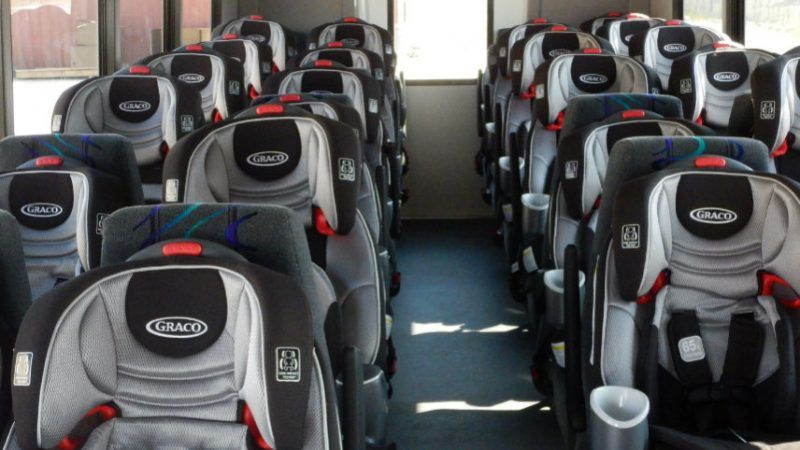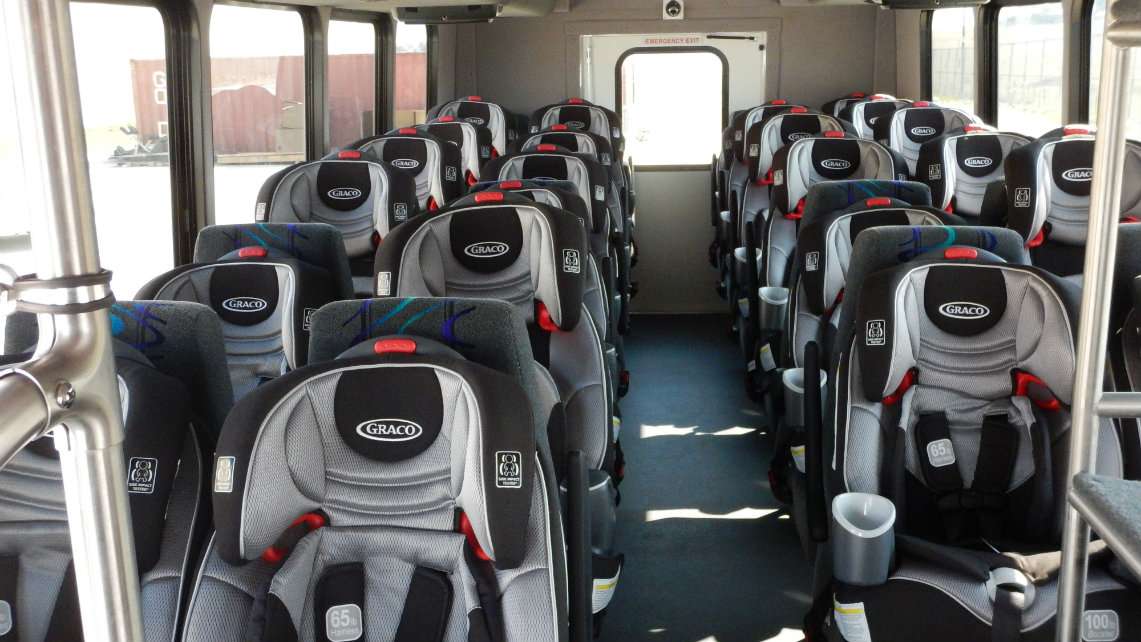What It Means That ICE 'Lost' 1,500 Refugee Children: Reason Roundup
Plus: Instagram shadowbans #strippers, and how to deal with all those privacy notices


Information about immigration agents, unaccompanied child refugees at the border, undocumented minors in the U.S., and which president started what has gotten mixed up in a number of ways over the long weekend. It turns out, many "Trump era" immigration problems have their roots in Obama-era enforcement and policies.
A photo purportedly showing new all-babyseat-outfitted immigrant detention buses in "Trump's America" went viral, after being shared by Fusion anchor Jorge Ramos in a now-deleted tweet. But as many people pointed out, the photo was from 2016, during Obama's presidency.
In a post retweeted more than 15,600 times, ABC Houston's Antonio Arellano described the vehicle as an Immigration and Customs Enforcement (ICE) agency "prison bus just for babies." But according to a 2016 press release from the family detention center that owned the vehicle, it was there "to provide offsite field trips" for the 4- to 17-year-old children enrolled in the center's school. "Field trips consist of going to a variety of places, such as the San Antonio Zoo, seeing a movie at the local theater, going to the park, etc.," said the GEO Group press release.
The bus may be a symptom of a broken immigration system, but it's not anything sinister in and of itself, and certainly not some special new transport created to roundup undocumented babies in Trump's America.
That's not to say that ICE has't been up to evil things, under the Trump and Obama administrations.
ICE agents "allegedly used stun guns on the minors for amusement or punishment, kicked them and threatened to either rape or kill them." https://t.co/w8BWc4R2vi
— Todd N. Tucker (@toddntucker) May 25, 2018
These allegations are based on federal records obtained by the American Civil Liberties Union (ACLU). They concern cases of unaccompanied minors caught attempting to cross the U.S.-Mexico border between 2009 and 2014. (Read the full report here.) These days, it's ICE's treatment of refugee minors traveling with their families that's raising alarms.
Earlier this month, Attorney General Jeff Sessions said anyone attempting to "cross the border unlawfully" would be prosecuted and that if they had a child with them, "that child will be separated from you, probably, as required by law. If you don't want your child separated, then don't bring them across the border illegally."
That news got conflated with another story, that of the government "losing" nearly 1,500 immigrant children. Many connected the dots and assumed these "lost" children were the same tots taken from their families by border agents, but this is incorrect.
There are two things going on. 1) HHS doesn't know where 1500 unaccompanied minors are. 2) we are separating parents and children at the border.
— josie duffy rice (@jduffyrice) May 28, 2018
The 1,475 unaccounted-for refugee children were explicitly ones who were caught at the border unaccompanied by a family member or adult. These kids are processed by the Office of Refugee Resettlement, then released to immediate or extended family or "other people that the child has a pre-existing relationship with," according to lawyer Josie Duffy Rice. "If none of those categories apply, then the kids normally stay in a shelter."
In checking in on these kids, the Department of Health and Human Services didn't put in a ton of effort. "Basically by all accounts HHS did a cursory reach out to check on these kids," explained Rice.
When I say cursory I mean cursory. We're talking about phone calls. Phone calls!! Like, no door knocks. No checking school records. They called. They didn't find answers.
— josie duffy rice (@jduffyrice) May 28, 2018
The children may be lost, or they may be with people trying to keep them away from immigration agents for a reason. "The problem," writes Ephrat Livni at Qz, "is that many of those missing kids may well be with their parents or families, and they may have gone off the grid deliberately to avoid" ICE agents. Livni explains further:
Once a child joins a sponsor, the ORR relinquishes responsibility—that's what has people up in arms now. The sponsorship agreement essentially leaves it up to the child and their sponsors to show up for further immigration proceedings.
That's not great. But demands to crack down on ORR release policies could make things worse for the kids who disappeared, and for those who will continue to arrive alone at the border. Asking ORR to be more strict about releasing undocumented kids, and keeping an eye on them after they are released, could make it harder for sponsors to step up and take in their family members. It could also incentivize more disappearances for those who do, forcing more families to exist underground to avoid authorities.
Instagram shadowbans sex-worker rights and strippers.
Everyone who said they knew the impact of #SESTA, that it was a narrowly written bill about holding traffickers accountable - where was this in your talking points? #LetUsSurvive #survivorsagainstsesta pic.twitter.com/SouAErbvcY
— Kate (@KateDAdamo) May 28, 2018
The #stripper category on Instagram is also no more.
As usual, more regulations made things worse. "If you're located in the EU, you're probably getting consent requests from every service you've signed up for since 1975," writes Mona Ibrahim at Polygon. The European Union's General Date Protection Regulation has led to compulsory revamping of privacy policies set by video games, social media sites, and virtually anything with a digital component. The change has led to an overwhelming amount of updates for customers in the U.S. as well as the E.U. "But, frankly, the disclosure requirements under GDPR seem to have one over-arching effect, and that's content-dense privacy policies that aren't as easy to navigate as companies want to believe," writes Ibrahim.
And while this may satisfy legal requirements under GDPR, the practical effect is information fatigue, despite guidance from the appropriate authorities to eliminate just that. These regulations were supposed to make things simpler for everyone, and they are not.
So what are the rights granted under GDPR? How are they enforced? Will you be able to take advantage of these new rights, or will they only benefit those in the EU?
Check out Polygon for a good explainer. And see Andrea O'Sullivan, writing here earlier this month, on how the new rules will make Facebook and Google even more powerful and "the EU's GDPR should serve as a cautionary tale for Americans eager to rein in tech titans."
- "Even when the criminal-justice system finally admits it got it wrong," writes Radley Balko, "it does so in a way that assigns the least culpability possible to the people who are most culpable for the injustice."
- Trump's on-again, off-again future meetup with North Korean leader Kim Jong Un gets a boost today by a visit from Chairman Kim Yong Chol, who will meet with Secretary of State Mike Pompeo in New York.
- Virginia Republican Rep. Thomas Garrett announced yesterday "that he is struggling with alcoholism and will abandon his run for a second term in Congress so he can focus on recovery and his family," reports The Washington Post.
- The infamous "Marshmallow Test" experiment might not mean what we think it means.


Show Comments (202)